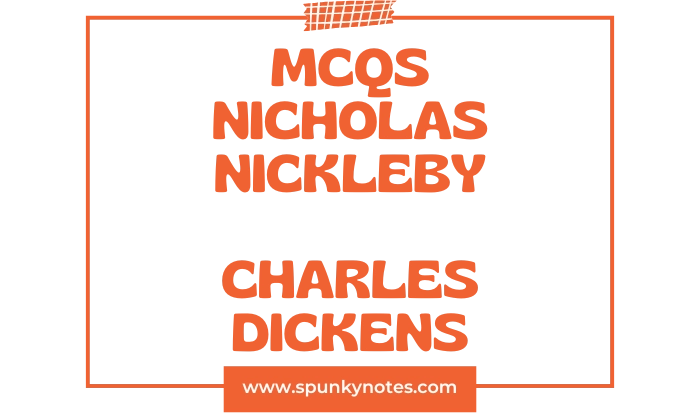

Estimated Reading Time: 18 min
Nicholas Nickleby MCQs
1. What relationship was Nicholas Nickleby to Ralph Nickleby?
A. Grandson
B. Brother
C. Nephew
D. Cousin
2. What was Mr. Nickleby (Nicholas’s father) advised to do with his money by Mrs. Nickleby?
A. Save it carefully
B. Invest it in land
C. Speculate with it
D. Donate it to charity
3. How old was Nicholas, very nearly, when Ralph first met him after his father’s death?
A. Seventeen
B. Nineteen
C. Twenty-one
D. Sixteen
4. What had Ralph Nickleby been thinking of doing with Nicholas’s education?
A. Sending him to university
B. Making him rich someday
C. Making something of him someday
D. Training him for law
5. Ralph Nickleby’s first proposal suggested Kate should be apprenticed to?
A. A boarding-school
B. Dressmaking
C. Tambour-work
D. A shop assistant
6. What was the common phrase that Nicholas reflected upon, which “often signifieth all the rascals in it”?
A. London life
B. Good society
C. The world
D. Human nature
7. When Nicholas left London, what amount of capital did he possess after paying his rent and settling with the broker?
A. Fifty pounds
B. Exactly twenty shillings
C. More than twenty shillings
D. Less than a sovereign
8. What was the name of the Academy run by Mr. Squeers?
A. Greta Hall
B. Dotheboys Hall
C. Snawley Academy
D. Yorkshire Hall
9. Where was Dotheboys Hall located?
A. Near London
B. Near Greta Bridge in Yorkshire
C. In Devonshire
D. Near Barnard Castle
10. What compulsory item was each boy required to bring to Dotheboys Hall, surprising Mr. Snawley?
A. A small knife
B. A razor
C. A nightcap
D. Six shirts
11. What did Mr. Snawley confess to Mr. Squeers that he actually was to the two boys he wished to enroll?
A. Their cousin
B. Their uncle
C. Their father-in-law
D. Their godfather
12. What did Mrs. Squeers administer to the boys on “brimstone morning”?
A. Sulphur and cream
B. Brimstone and treacle
C. Ginger and molasses
D. Honey and flower
13. What article of clothing worn by the tall, sickly boy Smike was “absurdly short in the arms and legs”?
A. An old suit of armour
B. A skeleton suit
C. Fustian trousers
D. A new shooting jacket
14. What philosophical teaching system did Mr. Squeers claim to follow?
A. The Newtonian system
B. The classical system
C. The practical mode
D. The grammar system
15. What task was the boy given after defining ‘horse’ as a ‘beast’?
A. To study more Latin
B. To go and look after Squeers’s horse
C. To memorize the grammar
D. To spell ‘quadruped’
16. What did Mrs. Squeers give Nicholas for supper?
A. A small glassful of brandy and water
B. A large slice of pie
C. An exclusive steak
D. Ale
17. What was Smike doing when he was found by Squeers the morning after the flogging?
A. Hiding in the kitchen
B. Asleep over the fire
C. In the schoolroom
D. Near the pony
18. What did Squeers hope to secure from Mobbs’s stepmother by flogging Mobbs?
A. Higher weekly pocket money
B. Cheerfulness and contentment
C. Cow’s-liver broth
D. The double-bladed knife
19. What did Nicholas do when Squeers beat Smike for the second time?
A. Nicholas ran away.
B. Nicholas thrashed Squeers soundly.
C. Nicholas complained to Ralph.
D. Nicholas was silent in fear.
20. What was Squeers’s annual salary for Nicholas?
A. Five pounds
B. Twenty pounds
C. Ten guineas
D. Twenty guineas
21. What name did Squeers apply to Smike during the attempted kidnapping scene, suggesting he was illegitimate?
A. An orphan
B. A vagabond
C. A fondling (foundling)
D. A wicked boy
22. What institution was Sir Matthew Pupker chairman of, where Ralph attended a meeting?
A. The Royal Society
B. The United Metropolitan Improved Hot Muffin and Crumpet Baking and Punctual Delivery Company
C. The Bank of England
D. The Literary Guild
23. What object was the second resolution at the public meeting intended to abolish the use of?
A. Muffins
B. Hand-bells (used by sellers)
C. Crumpets
D. Tea-kettles
24. Miss La Creevy worked as what type of artist?
A. Sculptor
B. Miniature painter
C. Landscape artist
D. Portrait painter
25. Why did Ralph consider Newman Noggs valuable?
A. His accounting skills
B. His eccentric taciturnity
C. His loyalty to the Nickleby family
D. His knowledge of London
26. What phrase did Mr. Mantalini frequently use to describe things he liked or disliked?
A. “Horrid”
B. “Demd” or “demnebly”
C. “Superfluous”
D. “Elegant”
27. What did the gentleman in the small-clothes ask Mrs. Nickleby in a loud whisper after checking for listeners?
A. If she was married
B. If she was a princess
C. If she was Miss La Creevy
D. If she wanted a cucumber
28. What did Sir Mulberry Hawk and Lord Verisopht bet upon regarding Miss Nickleby during the dinner?
A. Whether she would smile
B. Whether she was thinking ill of them
C. Whether she was engaged
D. Whether she would look him in the face
29. Nicholas met Mr. Vincent Crummles after what natural occurrence?
A. Losing his way
B. A stage coach accident
C. A duel
D. A political riot
30. What was the name of the Academy run by Mr. Squeers?
A. Greta Hall
B. Dotheboys Hall
C. Snawley Academy
D. Yorkshire Hall
31. What object did Nicholas suggest putting in the new show-piece he was commissioned to write?
A. A sword
B. A real pump and two washing-tubs
C. A stage coach
D. A coffin
32. What was the name Nicholas adopted while acting with the Crummles company?
A. Mr. Crummles
B. Mr. Johnson
C. Mr. Digby
D. Mr. Williams
33. What was the title of the French play Nicholas was tasked with turning into English?
A. The Moral Pocket Handkerchief
B. The Outlaw’s Return
C. The Mortal Struggle (or Intrigue, and Ways and Means)
D. The Lady Flabella
34. Who was Mrs. Crummles’s confidante and Nicholas’s potential love interest?
A. Miss Bravassa
B. Miss Ledrook
C. Miss Snevellicci
D. Miss Belvawney
35. What was the total amount of money Nicholas made from his benefit night in Portsmouth?
A. Five pounds
B. Twenty pounds
C. Fifteen shillings
D. Thirty pounds
36. Who was Henrietta Petowker’s new husband?
A. Mr. Kenwigs
B. Mr. Folair
C. Mr. Lillyvick, the water-rate collector
D. Mr. Squeers
37. To whom was the miller’s daughter (Tilda Price) engaged?
A. Nicholas Nickleby
B. The son of a small corn-factor (John Browdie)
C. Mr. Squeers’s son
D. A brigand
38. When John Browdie was talking to Squeers about Nicholas, what did he declare Squeers to be?
A. An excellent teacher
B. A loyal friend
C. An old rascal
D. A wise philosopher
39. What evidence did Ralph produce to prove Smike was Snawley’s son?
A. A handwritten note
B. Certificates as extracts from parish books
C. Smike’s birth mark
D. The word of Squeers
40. What were the first names of the two Cheeryble brothers?
A. Charles and Ned
B. Frank and Tim
C. Thomas and John
D. Nicholas and Ralph
41. What was the name of the clerk who worked for the Cheeryble brothers for forty-four years?
A. Newman Noggs
B. Frank Cheeryble
C. Tim Linkinwater
D. Mr. Trimmers
42. How was the young lady Nicholas loved first encountered at the Cheeryble counting-house?
A. She was applying for work.
B. She was in a fainting fit.
C. She was waiting for Ralph.
D. She was introduced by Frank.
43. What was the name of the young lady Nicholas fell in love with?
A. Kate Nickleby
B. Miss La Creevy
C. Madeline Bray
D. Miss Snevellicci
44. What debt did Arthur Gride seek to settle with Ralph Nickleby?
A. Nine hundred and seventy-five pounds, four and threepence
B. Five hundred pounds
C. Fifteen hundred pounds
D. One thousand, four hundred and seventy-five pounds, four and threepence
45. Who was the accomplice of Ralph Nickleby in the Madeline Bray marriage plot?
A. Mr. Bray
B. Arthur Gride
C. Mr. Snawley
D. Mr. Mantalini
46. Ralph encouraged Mr. Bray to marry Madeline to the old man by suggesting what might happen soon?
A. Bray would inherit money.
B. Gride would die, leaving her a rich widow.
C. Nicholas would leave London.
D. She would learn to love Gride.
47. What was the title of the piece that Mrs. Crummles was the original performer of, but had to give up because it was “too tremendous”?
A. The Fairy Porcupine
B. The Blood Drinker
C. Romeo and Juliet
D. The Mortal Struggle
48. What object did Newman Noggs use to knock Mr. Squeers senseless?
A. A cane
B. A pewter pot
C. An old pair of bellows
D. A candlestick
49. What event in Smike’s life did the brothers Cheeryble refer to that Ralph would “surely answer” for?
A. Being abducted by Squeers
B. His death from ill-usage
C. Being beaten by Nicholas
D. Running away from Dotheboys Hall
50. When offering his hand to Madeline Bray, Frank Cheeryble stated her heart was already occupied by whom?
A. Lord Verisopht
B. Nicholas Nickleby
C. Arthur Gride
D. Her father
Brief Overview
Nicholas Nickleby, written by Charles Dickens in 1839, tells the journey of a young man who must support his mother and sister after his father dies, leaving them in poverty.
Seeking help, Nicholas turns to his cold and greedy uncle, Ralph Nickleby, who views people only through wealth and profit.
Ralph sends Nicholas to work as a teacher at Dotheboys Hall, a boarding school run by the cruel Wackford Squeers, who abuses and exploits the children.
Horrified by the cruelty, Nicholas rebels against Squeers and escapes, taking with him a kind but weak boy named Smike, who becomes his loyal companion.
As Nicholas searches for honest work, he faces many struggles but also finds kindness from people like the theatrical Crummles family. Meanwhile, his sister Kate suffers under Ralph’s schemes, facing harassment from immoral men in high society.
Over time, Nicholas proves his courage, integrity, and compassion, eventually gaining success and respect. Ralph’s wickedness is exposed, leading to his downfall and tragic end.
The story concludes with Nicholas finding love, happiness, and stability for his family and Smike’s memory. Dickens highlights justice, resilience, and the triumph of goodness over cruelty.


